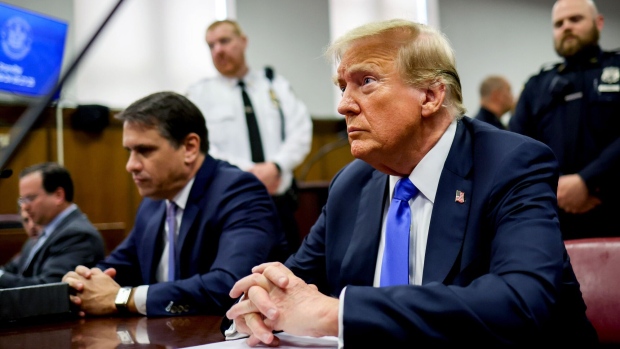Jul 2, 2024
Trump New York Sentencing Put Off to Sept. 18 Over Immunity
, Bloomberg News

(Bloomberg) -- Donald Trump’s sentencing in his New York hush-money case was delayed two months until Sept. 18 so the judge can review the impact of a landmark US Supreme Court ruling about presidential immunity.
Justice Juan Merchan in Manhattan set the new date Tuesday after Trump sought a delay as part of a bid to overturn his conviction on 34 felony counts of falsifying business records. The judge said he’ll impose the sentence if “necessary,” suggesting the possibility he could grant Trump’s request to throw out the verdict.
A Sept. 18 sentencing of Trump, the presumptive Republican nominee in the presidential race, would come less than seven weeks before his Nov. 5 rematch against President Joe Biden. Trump, 78, faces as long as four years in prison. Trump claims without evidence that the hush-money case, and three other indictments, are part of a “witch hunt” against him by Democrats.
The Supreme Court’s 6-3 decision on Monday came in a federal criminal case against Trump for attempting to overturn the 2020 election results. But his New York lawyers contend the ruling can be applied to some evidence and testimony presented to jurors in the hush-money case.
“I’d be surprised if Trump and his lawyers didn’t attempt to apply this opinion across the board in every case filed against him,” said David Weinstein, a former federal prosecutor who’s now a white-collar criminal defense attorney in Miami. But Weinstein said that even if Trump succeeds in having some of the evidence and testimony struck down, the judge “could find the rest of the evidence was overwhelming and deny the request to vacate the verdict.”
Prosecutors from Manhattan District Attorney Alvin Bragg’s office had said in a letter to Merchan that they wouldn’t oppose the delay. They said Trump’s request to file his formal motion on July 10 — a day before his scheduled sentencing — amounted to a bid to delay the hearing. The DA said Trump’s arguments to throw out the verdict are “without merit.”
A Manhattan jury on May 30 found Trump guilty on 34 counts of falsifying business records to conceal a hush money payment to an adult-film star on the eve of the 2016 presidential election. Trump’s lawyers argue that in light of the Supreme Court’s landmark ruling on presidential immunity, key evidence and witness testimony tainted the trial.
The majority sent the case back to a federal judge in Washington to oversee another round of legal wrangling over what exactly could survive in the federal indictment.
It’s unclear if Trump will succeed in his bid to overturn his New York conviction. Merchan and another judge have already rejected his immunity claims in the hush-money case, although both were made before the Supreme Court’s ruling.
‘Official Acts’
Jurors heard testimony and saw documents that could be evidence of “official acts” and might be barred under the Supreme Court ruling, according to the letter from Trump lawyers Todd Blanche and Emil Bove. They include Trump’s social media posts and public statements while in office; testimony by former White House officials Hope Hicks and Madeleine Westerhout; phones records involving Trump as president; and a financial disclosure form he filed in May 2018.
Much of the trial testimony, however, centered around actions by Trump before he took office. Michael Cohen, Trump’s former lawyer and fixer, testified that just weeks before the 2016 election, he paid $130,000 to porn star Stormy Daniels to stay silent about her alleged tryst with Trump. She had threatened to go public after the release of the Access Hollywood tape in which Trump discussed sexually assaulting women.
Cohen testified he repeatedly discussed Daniels with Trump, who blessed the repayment scheme. He said Trump authorized a plan to reimburse Cohen a total of $420,000, covering the Daniels check, payments for another vendor, an allotment for taxes and a bonus. Prosecutors argued Trump reimbursed Cohen for the hush-money scheme with several payments recorded as “legal services” in company books.
Prosecutors alleged that the case centered around an agreement between Trump, Cohen and former National Enquirer publisher David Pecker to buy and bury salacious news to help his chances of winning the election. That agreement was brokered at a 2015 Trump Tower meeting and continued after Trump was elected, prosecutors said.
--With assistance from Zoe Tillman.
(Updates with comment from a former federal prosecutor.)
©2024 Bloomberg L.P.